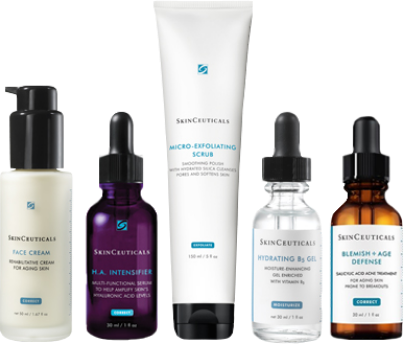Love the Skin You're In
Melasma Treatment
Dark, irregularly shaped patches of skin that develop on the forehead, cheeks, upper lip, or neck are the hallmark of melasma. This stubborn discoloration, often associated with hormonal changes, can cause you to feel self-conscious. Our specialists offer customized, effective melasma treatments for people in the Tampa, FL, area in Trinity, Port Richey, and Spring Hill.
What Causes Melasma?
Researchers have not pinpointed the specific cause of melasma—which primarily affects women—but several factors are known to trigger the condition. Hormonal changes, especially those experienced by pregnant women, are known to trigger melasma. In fact, the condition is often called the “mask of pregnancy” and can also be associated with hormonal birth control. Since the sun causes our skin to produce more pigment, melasma tends to develop in areas that get a lot of sun exposure, like the face, neck, and arms.
Certain medications, stress, and thyroid conditions have also been traced to the development of melasma.
How Do You Treat Melasma?
Applying a broad-spectrum sunscreen (SPF 30 or higher) throughout the day is the first line of defense if you have melasma, along with wearing wide-brimmed hats and long sleeves to provide additional protection from the sun. Women with melasma often use physical sunscreens such as zinc oxide, titanium dioxide, or iron oxide.
We provide different melasma treatments depending on the severity of the condition and the patient’s aesthetic goals. Treatments to improve the appearance of melasma focus on ridding the skin of excess pigment and promoting a more rapid turnover of skin cells. Removing old layers of skin makes room for fresh, healthy cells and brings trapped pigment to the surface so the body can shed it. Melasma treatment options include:
MOXI®
Choosing the correct laser to treat melasma is important because some lasers can worsen the condition if they aren’t appropriate for all skin types and tones. Women with darker skin tend to develop melasma more often, and some lasers can increase pigmentation in patients with brown or black skin. MOXI is an effective treatment option for melasma and other existing pigmentation problems because it does not produce the high levels of heat that can trigger hyperpigmentation issues.
Chemical Peels
Chemical peels with powerful ingredients such as TCA, kojic acid, salicylic acid, and phenol exfoliate the skin to remove layers of old, dead skin cells and stimulate cell turnover to reveal healthy, new skin. Chemical peels can be mild, medium, or deep, depending on the formulation. A treatment such as The Perfect™ Derma Peel is safe for all skin types and tones. Mild to medium peels require minimal downtime and pose less risk of unwanted side effects.
Retin-A
Also called tretinoin, Retin-A is a topical, prescription medication often used to reverse signs of aging. It can effectively treat melasma by increasing cell turnover and encouraging the growth of new collagen. Fresh skin cells with a more even tone and texture replace the brown and gray patches of melasma.
Other Treatment Options
In addition to the above treatments, some patients can benefit from skin brightener lightening creams that include ingredients such as hydroquinone and kojic acid. Prescription oral medications are also sometimes used to control melasma, but long-term use of many oral medications and lightening creams can carry risks.
Professional-Grade Skincare Products

Choose Our Specialists for Your Melasma Treatment
Our dermatology team has the experience and training to safely and effectively treat stubborn skin conditions such as melasma. After discussing your concerns and goals and performing a thorough skin examination, we will create a customized treatment plan for you. Request a consultation at Gulf Coast Medical Center Dermatology & Aesthetics using the online form or call us at (727) 318-5515 to schedule an appointment.
Melasma Treatment Providers
You'll get the time and attention you deserve from our experienced and highly trained board-certified physicians and our talented team of certified assistants.
Neko Futhey, PA-C
Certified Physician Assistant
Dermatology
Julie Hinojosa, MPAS, PA-C
Certified Physician Assistant Dermatology | Master Cosmetic Injector


